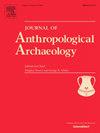Understanding the intersection of Rapid climate change and subsistence Practices: An isotopic perspective from a Mediterranean Bell Beaker case study
IF 2.2
1区 社会学
Q1 ANTHROPOLOGY
引用次数: 0
Abstract
Despite a long tradition of characterizing the Bell Beaker-associated human groups as mobile herders, there has been limited evidence for their economy and diet, both key defining factors for human lifeways. Bone nitrogen, carbon, and oxygen stable isotopes from a collective burial in Sardinia provide the first data on the diet of Mediterranean Bell Beaker groups, crucial as there is the presence of different domesticated species from the same context, thus enabling inferences on management practices. The data, evaluated in comparison with other groups, show high consumption of animal products and generalized, extensive livestock management, fitting the hypothesis of a relatively mobile lifestyle. Modeling of absolute dates and oxygen isotopic values suggest that the burials cover a period of fewer than two centuries, in which the group lived through a period of Rapid Climate Change, which overlaps with the 4.2 BP kya event previously recorded elsewhere in the Mediterranean, providing new elements for the understanding of demographic and cultural dynamics in the 3rd-millennium cal BC and more broadly emphasizing the role of climate in interpreting socio-cultural change.
理解快速气候变化和生存实践的交集:从地中海贝尔烧杯案例研究的同位素视角
尽管长期以来一直将与贝尔烧杯相关的人类群体描述为流动的牧民,但关于他们的经济和饮食的证据有限,这两个因素都是人类生活方式的关键决定因素。来自撒丁岛集体埋葬的骨氮、碳和氧稳定同位素提供了关于地中海贝尔烧杯群体饮食的第一批数据,这一点至关重要,因为在同一环境下存在不同的驯化物种,从而能够对管理实践进行推断。与其他群体进行比较后得出的数据显示,动物产品消费量高,牲畜管理普遍而广泛,符合相对流动生活方式的假设。对绝对日期和氧同位素值的建模表明,这些墓葬覆盖了不到两个世纪的时间,在此期间,该群体经历了一个快速气候变化时期,这与之前在地中海其他地方记录的4.2 BP kya事件重叠,为理解公元前3000年的人口和文化动态提供了新的元素,并更广泛地强调了气候在解释社会文化变化中的作用。
本文章由计算机程序翻译,如有差异,请以英文原文为准。
求助全文
约1分钟内获得全文
求助全文
来源期刊

Journal of Anthropological Archaeology
Multiple-
CiteScore
4.00
自引率
11.10%
发文量
64
期刊介绍:
An innovative, international publication, the Journal of Anthropological Archaeology is devoted to the development of theory and, in a broad sense, methodology for the systematic and rigorous understanding of the organization, operation, and evolution of human societies. The discipline served by the journal is characterized by its goals and approach, not by geographical or temporal bounds. The data utilized or treated range from the earliest archaeological evidence for the emergence of human culture to historically documented societies and the contemporary observations of the ethnographer, ethnoarchaeologist, sociologist, or geographer. These subjects appear in the journal as examples of cultural organization, operation, and evolution, not as specific historical phenomena.
 求助内容:
求助内容: 应助结果提醒方式:
应助结果提醒方式:


